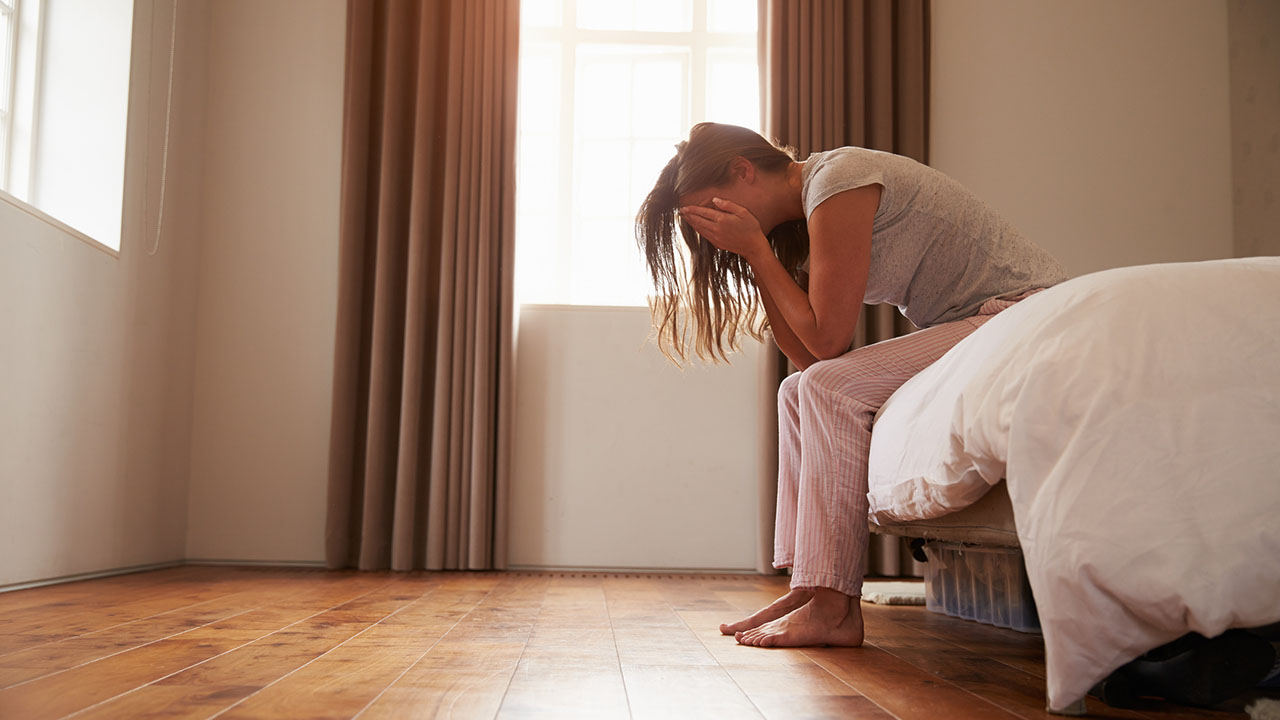 Monkey Business/Fotolia
Monkey Business/Fotolia
Living with a chronic illness can take everything you've got. Limitations and extra burdens will vary according to the type of illness. Entering menopause and contending with hot flashes heaps coals on an already difficult life.
This is by no means an uncommon situation, however. The North American Menopause Society reports that about 75 percent of American women in perimenopause experience hot flashes.
And the CDC says that in 2012, about half of all American adults have at least one chronic condition. About one-quarter of adults in the United States have two or more such conditions.
I live with a chronic condition known as myalgic encephalomyelitis. For several years, I also suffered from hot flashes due to menopause. This was an exceptionally miserable period in my life. The M.E. is chronic, but the hot flashes, fortunately, seem to be history now.
Symptoms of Myalgic Encephalomyelitis
I became chronically ill with M.E. in the autumn of 1999 at 44 years of age. My symptoms left me exhausted, weak, and feeling like I was vibrating. M.E. affects multiple body systems, including the endocrine system, cardiovascular system, digestive system, immune system, and central nervous system.
It affected my balance, as well as my ability to remember things and to comprehend what was being said to me. Mental processing was slow. Rest periods were needed frequently. I wasn't doing much due to my cognitive and energy deficits, but even so I needed three two-hour naps during the day, every day.
Hot Flashes Make Life More Complicated
A couple of years into this, I began to experience hot flashes due to menopause. What's a few more symptoms to contend with, right? It almost seemed fitting when I began to experience the slow simmer that is a hot flash.
Riding it out was something I learned to do fairly quickly since I already had to work with body rhythms and glitches for a few years from M.E. by this time. I had ceased to be surprised when some new problem arose.
I was fortunate in that I did not turn bright red or throw off rivers of perspiration. I didn't need to strip off clothing; I wasn't compelled to fling open windows in winter or immerse myself in cold water. A friend of mine lived in that uneasy state for several years. Mine were more subdued, but there was no mistaking them.
What’s a Hot Flash Like?
A hot flash cannot be mistaken for a raise in body temperature due to being in an extra-warm room – turning down the thermostat will not cool things off. The warmth seems to emerge from within rather than hitting the body from the outside, like being out in the hot sun can do.
Tips for Dealing With Hot Flashes
I got in the habit of dressing in layers, no matter what the season. My hot flashes hit mostly in the evenings, and I would discard a cardigan as things heated up. Sometimes that was enough. When it wasn't sufficient, off would come the buttoned shirt, leaving a cotton turtleneck. Its long sleeves may or may not be shoved up past my elbows before too long.
As the hot flash abated, I would push down the sleeves of my cotton turtleneck, and eventually I'd have my button-up shirt and cardigan back on, as well.
That was usually enough disrobing, in most instances. Things were still too warm for comfort, but I had come to realize that my hot flashes were relatively short-lived, lasting perhaps 20 minutes or so.
I might have several in an hour, and this might repeat itself a number of times throughout an evening. But as I contemplated the many women who soaked through their sheets night after night, I felt I didn't have much to complain about.
Life with hot flashes can be challenging, but a little research into treatment alternatives and even simple lifestyle changes can make a big difference.
- Can't take the heat? Turn on a fan or the air conditioning. Try a little internal cooling with a cold drink, or something to eat from the fridge or freezer.
- Caffeine and alcohol may initiate hot flashes, so proceed with caution.
- Meditation or breathing slowly and deeply may ease some hot flashes.
- If you smoke, try to quit.
- If you are carrying some excess weight, losing some of it may help reduce hot flashes.
- Qigong, tai chi, and yoga may help. Acupuncture and hypnosis may be beneficial for some.
Alternative Treatments for Hot Flashes
Many women use herbal treatments such as black cohosh, dong quai, evening primrose oil, ginseng, and red clover. Reported benefits vary from woman to woman, and a recent review by the North American Menopause Society concluded that many of these nonhormonal treatments, including herbal remedies, were no more effective than a placebo and did not recommend them as a stand-alone treatment. Always talk with your health care practitioner about the combination of herbal supplements with any medications you may take.
Talk to Your Health Care Practitioner
When you're preparing for an appointment with your health care practitioner, make some notes.
Keep track of how often you have hot flashes, their severity, and when you have them. Write a list for your health care practitioner of anything you are taking. That includes herbs, vitamins, and other supplements as well as medications, both prescription and over the counter.
Questions on your mind? Write them down so you can ask your health care practitioner. Consider taking someone with you to your appointment who can help you remember everything later.
Sources:
Hot Flashes. Menopause.org. Retrieved January 17, 2016. http://www.menopause.org/for-women/sexual-health-menopause-online/causes-of-sexual-problems/hot-flashes
Chronic Diseases: The Leading Causes of Death and Disability in the United States. CDC.gov. Retrieved January 17, 2016. http://www.cdc.gov/chronicdisease/overview
Chronic Fatigue Syndrome: Cardiovascular System and Orthostatic Intolerance. Empowher.com. Retrieved January 17, 2016. https://www.empowher.com/heart-amp-blood/content/chronic-fatigue-syndrome-cardiovascular-system-and-orthostatic-intolerance
Multi-System Breakdown in CFS: Central Nervous System. Empowher.com. Retrieved January 17, 2016. https://www.empowher.com/wellness/content/multi-system-breakdown-cfs-central-nervous-system
Multi-System Breakdown in CFS: Post-exertional Malaise. Empowher.com. Retrieved January 17, 2016. https://www.empowher.com/mental-health/content/multi-system-breakdown-cfs-post-exertional-malaise
Lifestyle and home remedies. Mayo Clinic. Retrieved January 17, 2016. http://www.mayoclinic.org/diseases-conditions/hot-flashes/basics/lifestyle-home-remedies/con-20034883
Alternative medicine. Mayo Clinic. Retrieved January 17, 2016. http://www.mayoclinic.org/diseases-conditions/hot-flashes/basics/alternative-medicine/con-20034883
Do Mother Nature's Treatments Help Hot Flashes? Menopause.org. Retrieved January 17, 2016. http://www.menopause.org/for-women/menopauseflashes/menopause-symptoms-and-treatments/natural-remedies-for-hot-flashes
Preparing for your appointment. Mayo Clinic. Retrieved January 17, 2016. http://www.mayoclinic.org/diseases-conditions/hot-flashes/basics/preparing-for-your-appointment/con-20034883
Nonhormonal management of menopause-associated vasomotor symptoms: 2015 position statement of the North American Menopause Society. Menopause 2015;Vol. 22 (11):1155-1174.
Reviewed January 18, 2016
By Philip Sarrel, M.D. and Lorna Sarrel, M.S.




